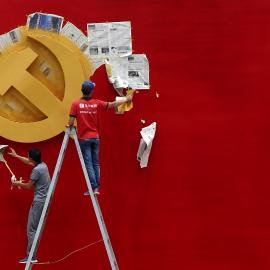To the Editor:
I do not question Gerald Segal's figures, which show that China is not a superpower ideologically, politically, economically, or militarily. I also agree with Segal that China is a second-rank middle power that wants to appear more powerful. But China matters for a number of reasons. First, China is a non-status quo power, struggling to find its role in a world governed by Western rules. Furthermore, the Chinese have yet to come to terms with their history. The superiority and inferiority complexes developed over the past 150 years led many to experience a victimization syndrome. Finally, the insecure Chinese regime is inclined to boast about itself on the one hand and pass the blame for its failures on the other.
Segal takes the Chinese leadership's theatrical performance too seriously, more so than the Chinese themselves take it. China matters not because it "has mastered the art of diplomatic theater." In fact, many Chinese would argue that, as a whole, the present leadership has a poor diplomatic record when compared with Mao Zedong's show of strength or Zhou Enlai's sophistication. Indeed, the Chinese constantly joke about Jiang's clumsiness and his eagerness to show off.
And yet China matters because whichever way it goes will affect all of us. If China becomes economically aÛuent -- which is still possible despite the last 150 disappointing years -- its buying power will alter the global economic landscape. If China becomes unhappy with the status quo and decides to reclaim Taiwan and the entire South China Sea, the war calamities would be too great to contemplate. But what if China goes down the drain? Should civil war and chaos engulf it, how would the world cope with Chinese refugees? Finally, suppose China simply plods along, neither fast enough to become a superpower nor slow enough to embrace disasters. Will the earth be able to cope with China's environmental problems? The bottom line is not whether China wants to matter. Rather, it is the massive scale of its problems and their potential implications for the world.
MOBO C.F. GAO
Director, Asian Center, University of Tasmania
